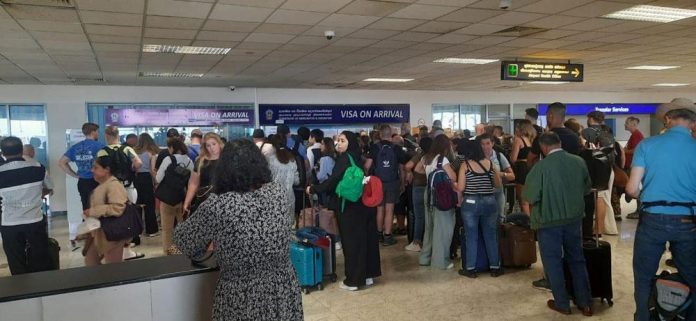A special audit report on Sri Lanka’s controversial online visa issuance system has revealed massive financial losses to the government and exorbitant fees charged to travelers during the brief, chaotic period the service was managed by a foreign consortium.
The report, which examined the operations of GBS Technology Service, IVS Global-FZCO, and VF Worldwide Holding Ltd (VFS) between April 17 and August 2, 2024, found the state lost an estimated USD 1.4 million in unremitted taxes alone.
During this period, travelers faced a “significantly increased” cost burden. A mandatory service fee of USD 18.50 was imposed on all applicants, a stark contrast to the USD 1 fee proposed under a previous planned upgrade.
Government Revenue Lost
The audit’s primary finding was the failure of the service provider to remit taxes collected from applicants to the Inland Revenue Department.
- Unpaid Taxes: The company collected the 18% Value Added Tax (VAT) and the 2.5% Social Security Contribution Levy (SSCL) from applicants but failed to pay this revenue to the government.
- Missing Revenue: Based on 373,991 visa applications, the lost tax revenue is estimated at USD 1,418,360. The audit states the total tax collected and withheld by the company was at least USD 1,820,418.
- Unremitted Visa Fees: The provider also failed to remit the standard visa fees collected from 1,013 applicants to the Department of Immigration and Emigration (DIE).
Travelers Faced Exorbitant and Hidden Fees
The audit confirmed that visa applicants were subjected to a barrage of new and improperly calculated charges.
- ‘Fee-Waiver’ Costs: Even tourists from countries designated for free visas were charged. The provider collected service fees from 98,401 “fee-free” applicants, earning the company USD 1,820,418 in service fees on visas that generated no income for the government.
- SAARC Overcharging: Applicants from SAARC countries were incorrectly charged USD 75 for a 180-day visa, far exceeding the gazetted fee of USD 35. This error alone resulted in an estimated USD 33,080 in excess charges from just 827 applicants.
- Hidden ‘Facilitation’ Fees: The stated USD 18.50 service fee did not include other charges. The audit cited an invoice for one Canadian tourist showing an additional USD 14.19 “facilitation fee” tacked on, bringing the total cost to USD 232.69.
- System Glitches: Deficiencies in the system meant some applicants whose e-Visas were approved with incorrect passport details were forced to pay their visa fees twice upon arrival.
Flawed Banking and Lack of Transparency
The audit highlighted severe mismanagement in how state revenue was handled, creating significant financial risk.
The agreement allowed the service provider to credit all collected fees—including visa fees, service fees, and taxes—directly into its own foreign bank account. The government’s visa fee portion was only remitted back to the Department of Immigration and Emigration after a delay of one to six days.
The audit noted that no formal permission was obtained from the Treasury or the Central Bank of Sri Lanka to transfer this locally generated income via a foreign company’s offshore account.
Furthermore, the company’s financial deposit, eventually raised to USD 500,000, was deemed “insufficient.” On April 29, 2024, alone, the visa fees collected amounted to USD 952,860, far exceeding the deposit meant to protect state revenue.
The audit concluded that due to the system’s structure, the Department of Immigration and Emigration lacked accurate records of the income collected, making it “impossible to verify the accuracy and transparency” of the revenue earned during this period.




